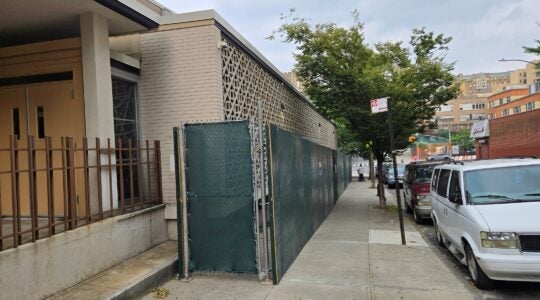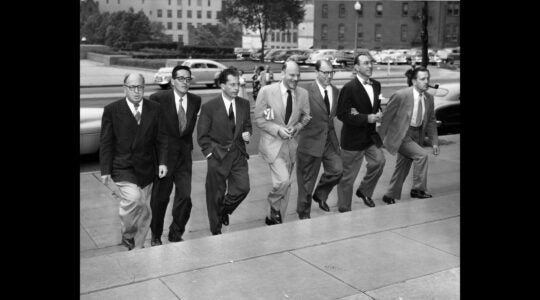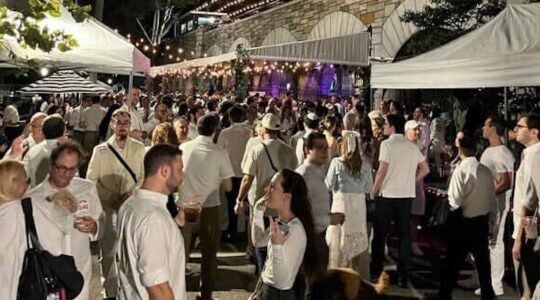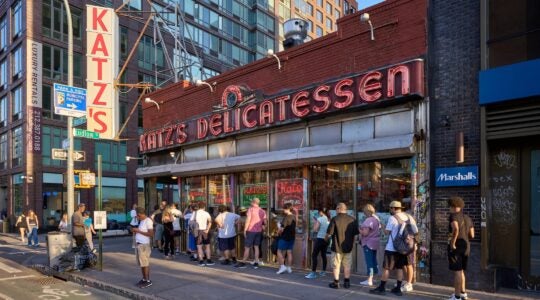In the desert, the Israelites longed for the food of Egypt: its fish, cucumbers, melons, leeks, onions, garlic and especially the “flesh-pots,” in which meat was cooked.
Albert Allaham, a butcher and restaurateur who just opened a high-end kosher steakhouse near Wall Street, understands that culinary nostalgia, even down to the primal longing for animal protein. But just as the Israelites made their difficult way through the desert to the Promised Land, so did the Allahams — his father and mother, and his five siblings, and the extended family — leave their homeland, Syria, behind in an effort to build better lives for the tribe.
“I wanted to leave,” said Allaham, 27. “We left late,” he said, referring to his move to America in the late 1990s, “and everyone I knew was here already. You want to be with your friends, your cousins.”
Meat was even the reason the family stayed as long as it did. Their name means “butcher” in Arabic, and the Allahams say that their family’s butcher business in Damascus began over 200 years ago. Allaham’s father was reluctant to leave it, and if he had to do so, he wanted to sell at a good price, and not in a hurry as many others did.
“My grandpa would wake up at 3, 4 in the morning to go to the slaughterhouse,” Allaham said. “Here, the meat comes vacuum-packed and salted. In Syria, you would have to break down the cow.”
Allaham’s cousin Joey, also surnamed Allaham, who is about a decade older and who arrived in the United States earlier, brought the family business over. He owns the Prime Grill, widely acknowledged as first kosher steakhouse whose meat can compete with that of similar non-kosher establishments.
“Ten, 12 years ago you had some upscale kosher restaurants, but Joey put kosher on the map,” said Elan Kornblum, publisher of Great Kosher Restaurants magazine.
Today, Joey Allaham owns four restaurants and just announced the opening of a fifth, plus a pizza takeout place and a butcher shop that opened on the Upper East Side in 2012. Albert’s family made its start here in 2004 by opening a butcher shop, King’s Glatt, on Kings Highway in Midwood.
In 2008, the family opened Prime Cut nearby on Avenue U, whose striped awning sits cozily among several other small shops and businesses on a low-slung block near Ocean Parkway, in the heart of Syrian Brooklyn. The shop is a carnivore’s dream: Its shelves and cases are lined with slab after slab of firm, glistening pieces of meat, some intricately bound in twine, many marbled with creamy fat, a few topped with tinfoil crowns.
It’s also packed with Allahams, who are both butchers and brothers, clad in white aprons and speaking to each other in Arabic. Albert is one of five boys; he also has one sister, who is the youngest. Three of the brothers are in the business with Albert.
“It’s the thing we know how to do,” Albert said. “And my father knows a lot more about meat than me.”
The family may have arrived relatively late to the community, but its story is typical. Syrian Jews arrived in New York at the start of the last century amid a huge wave of Jewish immigration, but instead of lingering on the Lower East Side they moved on to Brooklyn. There, their numbers were boosted in the 1990s when Syrian President Hafez al-Assad permitted those remaining in Syria to leave.
Today, Syrian Jews are known for their ability, formidable even among likeminded Jewish communities, to maintain their own identity and numbers even as members operate successful businesses, many of them outside the enclave.
Indeed, Albert and his brothers who have married have done so young, and within the community; he already has a toddler daughter. Only one of the brothers attended college, and he went for only two years; they are all businessmen. Their father guides the meat operations while the younger generation, especially Albert, plans next moves.
This winter, Albert’s branch of the Allaham clan also made the jump into restaurants with the 300-seat Reserve Cut, a fancy steak place in the Financial District: Some of the 12-ounce pieces can top $50.
“We’re five boys. We go out a lot. We weren’t happy with the quality of the meat we found in restaurants,” Allaham said.
The restaurant is on Broad Street and serves the mortal Master of the Universe crowd at dinner and lunch. The aesthetic matches its location in a luxury apartment building, the Setai. The restaurant has exotic Asian accents, lustrous hardwoods on floors and walls and a hallway lined with glass walls holding bottles of wine lit to make them glow.
Unlike most meat in kosher or non-kosher restaurants and butcher shops, the product at Reserve Cut and Prime Cut is, as the name of the shop indicates, graded USDA Prime, the label that connotes the juiciest, most tender steak because it has more fat, more evenly distributed throughout the meat. The restaurant offers more than 10 different types of prime steak.
“We saw customers who were amazed, who said, ‘This is the best steak we’ve ever had, how is this kosher?’” he said. “Kosher does not mean it’s not good.”
Reserve Cut is the only kosher steakhouse of its kind in the Financial District, but the city is stocked with such places, including Abigael’s on Broadway, Mike’s Bistro, and, of course, cousin Joey’s joints.
“The whole family’s been in the business for generations,” Kornblum said, “so this is in their blood.”
The New York Jewish Week brings you the stories behind the headlines, keeping you connected to Jewish life in New York. Help sustain the reporting you trust by donating today.




